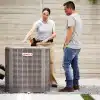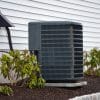The lifespan of a heat pump in your home can vary depending on several factors, including the type of heat pump, how well it’s maintained, and its usage. On average, a well-maintained heat pump can last anywhere from 20-25 years. However, some heat pumps can last even longer with proper care and regular maintenance.
Quality of Installation
A professional and proper installation is crucial for the longevity of a heat pump. An improperly installed system may have a shorter lifespan and reduced efficiency.
- A professional installer evaluates your home’s specific needs, recommends suitable heat pump models, and ensures proper sizing and placement. This attention to detail during installation lays the foundation for a longer-lasting and efficient system.
- Seeking professional assessment ensures correct installation, resolving issues promptly, enhancing efficiency, and preventing potential long-term damage.
- Improper installation can lead to reduced efficiency, increased energy costs, and potential long-term damage, impacting your system’s overall lifespan.
- If you notice uneven heating or cooling, strange noises, or a sudden increase in energy bills, it’s time to consult an HVAC professional to assess your system’s installation.
Maintenance
Regular maintenance, such as cleaning filters, checking refrigerant pressures, and ensuring proper airflow, can extend the lifespan of a heat pump. Neglecting maintenance can lead to reduced efficiency and a shorter lifespan.
- For annual check-ups, unusual sounds, reduced efficiency, or any visible signs of wear and tear, it’s advisable to consult a professional promptly.
- A professional maintenance service includes thorough inspections, cleaning of components, checking refrigerant levels, and optimizing airflow. This proactive approach ensures optimal performance and catches potential issues before they escalate.
- Regular professional maintenance improves system efficiency, prolongs lifespan, identifies issues early, and saves on long-term repair costs.
- Neglecting maintenance can result in decreased efficiency, higher energy bills, and potentially costly repairs or premature system failure.
Type of Heat Pump
Different types of heat pumps have varying lifespans.
- Water-source heat pumps, similar to ground-source heat pumps, utilize water as a heat source or sink, often from a well, lake, or pond, and last 20-25 years.
- Air-source, or hybrid heat pumps combine a traditional furnace or boiler with a heat pump to provide efficient heating and cooling. They switch from extracting heat from the outdoor air in winter and expelling heat to the outdoors in summer. These last 20-25 years.
- Ductless mini-split heat pumps consist of an outdoor compressor/condenser unit and one or more indoor air-handling units, allowing for zone-specific heating and cooling without the need for ductwork. These heat pumps last 15-20 years.
When considering a new heat pump installation or transitioning between different types of heat pumps, consulting a professional is crucial. Professional guidance ensures you choose the right type for your needs, optimizing efficiency and longevity.
Choosing the wrong type can lead to inefficient heating or cooling, increased energy consumption, and potential system malfunctions. Professionals consider factors such as your property size, insulation, and local climate to recommend the most suitable heat pump type. This tailored approach ensures optimal performance and longevity.
Climate
The climate in your area can also affect the lifespan of a heat pump. Heat pumps in regions with extreme temperature variations or harsh weather conditions may experience more stress and wear, potentially reducing their lifespan.
- If your heat pump struggles in extreme weather conditions or exhibits inconsistent performance, consulting a professional for adjustments is advisable.
- Professional adjustments enhance your heat pump’s resilience, ensuring reliable performance in varying climates.
- Neglecting climate considerations can result in increased wear and tear, reduced efficiency, and potential system breakdowns during extreme weather conditions.
- A professional can recommend climate-specific adjustments, such as insulation improvements or system modifications, to enhance your heat pump’s efficiency and lifespan in diverse weather conditions.
Usage
The frequency of use and workload can impact the heat pump’s lifespan. A heat pump used year-round for both heating and cooling may experience more wear compared to one used only for heating during the winter.
- If your usage patterns change, or you notice irregularities in performance, consulting a professional can provide valuable insights.
- Professional advice helps you optimize usage, ensuring efficient heating and cooling aligned with your specific needs.
- Inefficient usage can lead to increased energy consumption, decreased system efficiency, and potential long-term damage.
- Professionals can assess your usage habits, recommend energy-efficient practices, and optimize your heat pump settings for enhanced performance and longevity.
Brand and Quality
The quality and brand of the heat pump can also make a difference. Higher-quality units from reputable manufacturers may last longer than lower-quality alternatives.
- When considering a new heat pump purchase or upgrading your existing system, consulting a professional for recommendations is essential.
- Professional recommendations guide you to reputable brands and models, ensuring you invest in a high-quality, reliable system.
- Choosing low-quality systems can result in frequent breakdowns, higher maintenance costs, and a shorter overall lifespan.
- Professionals stay informed about the latest industry trends, helping you make informed decisions about reputable brands and models. Their insights ensure your investment aligns with your long-term heating and cooling needs.
Conclusion
To maximize the lifespan of your heat pump, it’s essential to use a professional HVAC installation service that is regularly maintained and used efficiently. Be sure to follow the manufacturer’s recommendations for maintenance and operation to ensure it performs optimally and lasts as long as possible.





